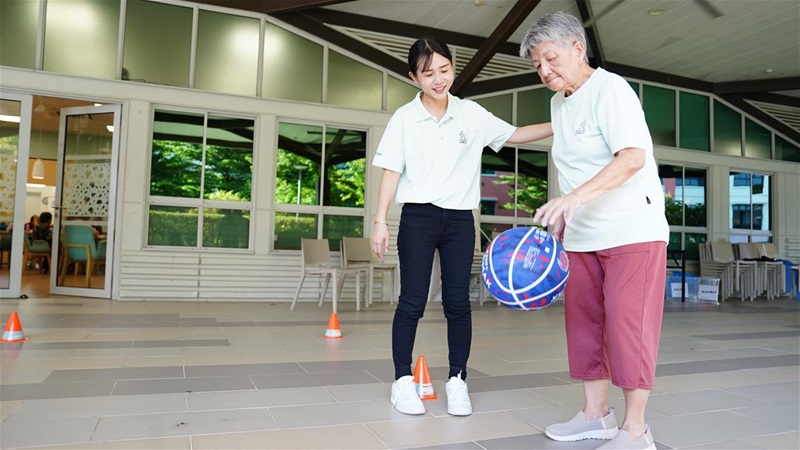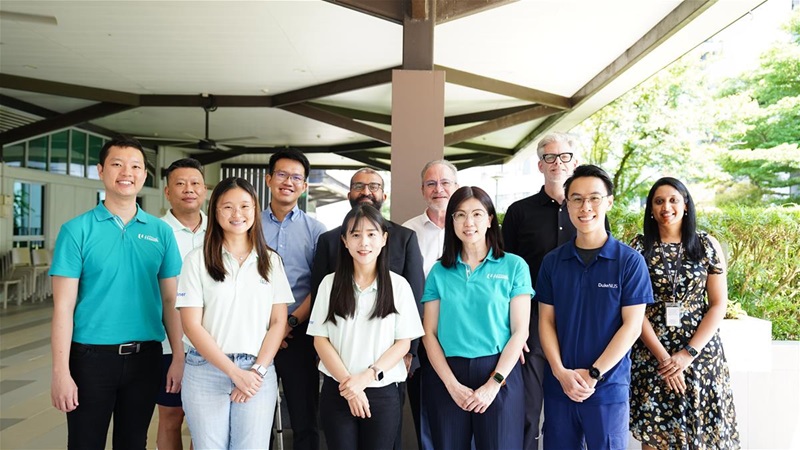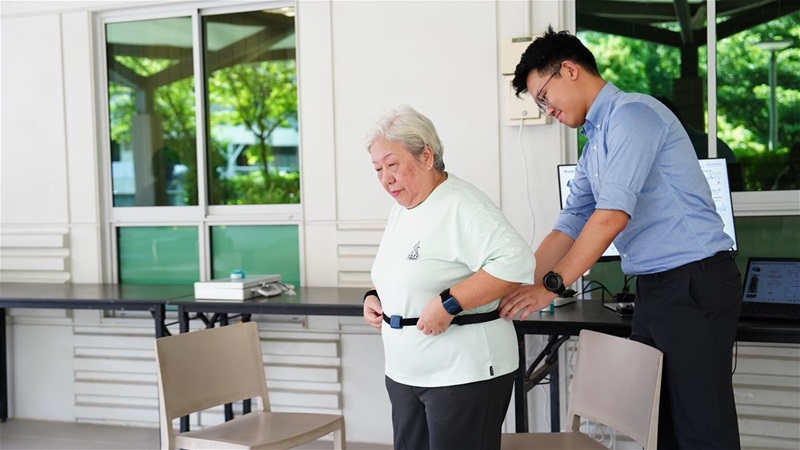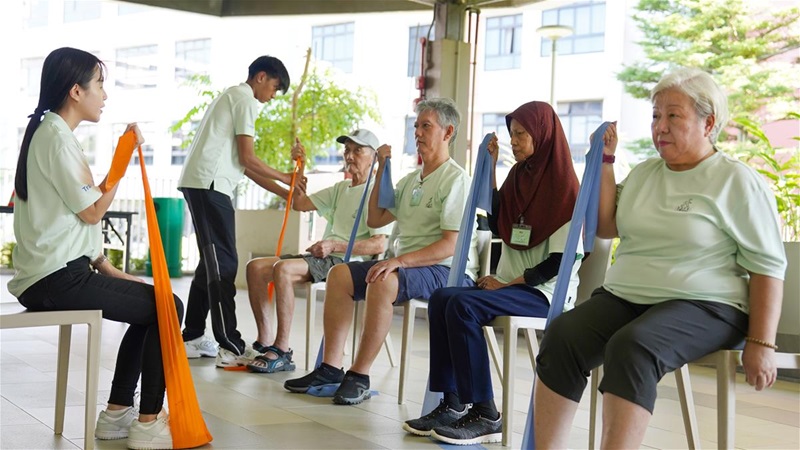Back
Monday, 28 Oct, 2024
Duke-NUS-led team pioneers first-of-its-kind AI tool to mitigate falls risks among elderly
Ever since she lost her balance during a bus ride two years ago, 78-year-old Madam Tan Yok So felt anxious about venturing out of her house.
That fall, in which she hit her head, led to a fear of bus rides, and she stopped taking the bus altogether.
She was also plagued by knee pain that left her unable to climb stairs on her own. Not wanting to impose on her family, she rarely stepped out of the house.
The retired private tuition teacher is not alone. Every year, one in four seniors over 65 is likely to have a fall1 and the risk escalates with age. In Singapore, 85 per cent of all geriatric trauma cases seen at the Emergency Department are due to injuries from falls.2
Yet there are relatively few falls prevention programmes that cater to seniors who are likely to fall.

Madam Tan Yok So (right) doing exercises as part of the SAFE-TECH pilot study // Credit: Norfaezah Abdullah, Duke-NUS
Recognising this gap, final year PhD student at Duke-NUS Medical School, Vanessa Koh, was motivated to conduct research in this area. The topic is also close to her heart with her 86-year-old grandmother being prone to falls. Four years ago, the elderly lady fell while riding a bicycle—she had a lot of groceries in her basket and couldn’t maintain her balance. She was hospitalised for almost two weeks.
“While there are general, group-based exercise programmes, such as Tai Chi, chair yoga or Zumba classes, that improve mobility and maintain physical fitness in the average older adult, these may not be as effective for seniors who are at higher risk of falls. This is because each older person has a unique set of circumstances and diverse risk factors, which may not be addressed with a one-size-fits-all approach,” shared Koh.
She is part of a team of researchers from Duke-NUS and ETH Zurich trying out a novel approach. Integrating technology and eldercare, they’ve developed Singapore’s first fall-risk screening algorithm for seniors.
The algorithm will help to screen and identify seniors at higher risk of falls so that programmes can be customised for them to more effectively prevent falls.

The research is part of a collaboration between Duke-NUS, Singapore ETH Centre and community partners like NTUC Health Active Ageing Centres // Credit: Norfaezah Abdullah, Duke-NUS
It’s part of a study titled ‘Targeted Assessment and Recruitment of Geriatrics for Effective Fall Prevention Treatments’ (TARGET), where 2,300 seniors answered a questionnaire about their psychological and emotional health and wore wireless sensors to collect data on their physical mobility status.
The seniors were given six sensors to wear (one shaped like a belt on their waist, one on each arm and foot, and one on the forehead via wearing a cap) to analyse gait performance during a five-minute walk.
The sensors collected gait variables such as distance walked, step length, step time, stride length, stride time and swing time.
Unlike most current assessments, these tests do not have to be administered by a doctor or specialist—they can be carried out by trained administrators in the community, further reducing costs and increasing accessibility.
The wearable sensors, known as ZurichMOVE, were developed by ETH Zurich.
The seniors also did sensory impairment and cognitive screeners as well as bone density scans.
With the comprehensive data collection and analysis, the researchers were able to identify critical risk factors, using these to develop a novel algorithm that can predict if individuals were likely to fall. The algorithm is now being validated over a two-year follow-up period.
Associate Professor Angelique Chan, Executive Director of the Centre for Ageing Research & Education at Duke-NUS, who leads the TARGET study, said: “Our findings reveal a diverse array of risk factors impacting Singapore’s elderly, highlighting the complexity of falls prevention. These risk factors include previous fall history, living environment, poor eyesight and multiple chronic conditions including cognitive impairment. Preventing falls among the elderly therefore calls for a broad approach to address multiple factors, but also requires customisation for one’s unique circumstances.”
“Most falls occur during movement—older adults, in particular, have a higher risk of falls and other related health issues. Examining the roles of gait, balance and postural stability in individuals at high risk of falls, are therefore important. Our research focuses on non-invasive assessments for fall detection and will ultimately contribute to the Healthy Ageing Index for elderly Singaporeans,” added Professor Ecosse Lamoureux, from the Health Services & Systems Research Programme at Duke-NUS, who is also Director of the Population Health and Clinical Epidemiology Platform at the Singapore Eye Research Institute. He is one of the collaborators on the TARGET study.
The seniors identified as being at high-risk of falls by the TARGET study were then invited to take part in a second study called ‘Steps to Avoid Falls in the Elderly: A TECHnology Enhanced Intervention’ (SAFE-TECH).
The SAFE-TECH study, which runs from August 2024 to February 2026, aims to determine the effectiveness of a comprehensive falls prevention programme, conducted in venues near the homes of the seniors for greater convenience. The programme covers physical exercises to improve aspects such as strength, balance, coordination and endurance, which can be tailored to an individual’s needs; as well as educational modules covering environmental hazard, medication, diet, pain management, footwear and how to mitigate risks.

Study participant Madam Chua Jway Khiaw putting on the
ZurichMOVE wearable sensors to analyse her gait performance // Credit: Norfaezah Abdullah, Duke-NUS
Madam Tan is one of the seniors who joined the SAFE-TECH pilot study, which ran for 12 weeks from April to July 2024, attending sessions twice a week at NTUC Health Active Ageing Centre (Care) at Jurong Central Plaza.
During these sessions, a team of physiotherapists tailored the intervention components according to each older adult’s risk factors and physical conditions. Madam Tan did exercises to improve her strength and flexibility, among others. She also learnt how to manage fall risk factors such as by wearing suitable footwear and taking in more protein to strengthen her muscles.
Following these sessions, Madam Tan saw a marked improvement: “I can now navigate short flights of steps! I feel more confident and can go out on my own to buy groceries and even go for my polyclinic appointments!”
She has also resumed taking the bus and enjoys going for more outings with her children.
Professor David Matchar in the Health Services & Systems Research Programme at Duke-NUS, and the leader of the SAFE-TECH study, shared: “Current falls prevention programmes tend to be generic, usually catering to a large-group, mass audience. But interventions that are personalised and held for just for one person are not cost-effective. In our programme, we have found the ‘sweet spot’ to balance costs and benefits—we are gathering individuals with specific and similar needs to personalise activities for them, but still controlling costs by conducting these sessions in groups.”
Both TARGET and SAFE-TECH are components of the Future Health Technologies research programme supported by the National Research Foundation, Singapore and ETH Zurich.

A SAFE-TECH intervention session where elderly participants do strengthening exercises // Credit: Norfaezah Abdullah, Duke-NUS
Dr Benedikt Helgason, Co-Director of the Future Health Technologies research programme at the Singapore-ETH Centre, said: “Previous studies have typically focused on either falls and fractures risk, or how to mitigate such risks. We are taking a unique approach to address both aspects and reduce the socio-economic burden of falls that cause severe injuries. To do so, we have built a multi-disciplinary team that bridges technology, social sciences, clinical work and healthcare economics. In Singapore, we were fortunate to find collaborators with the right skillsets and the innovative spirit needed to improve care and quality of life for our elderly.”
The SAFE-TECH trial is currently being conducted in the community—in active ageing centres located across Singapore. NTUC Health Active Ageing Centre (Care) at Jurong Central Plaza is one of the ten sites.
The Duke-NUS team is now working with its venue partners, which include active ageing centres and eldercare day rehabilitation centres, to scale up the programme to reduce falls risk among older adults in a systematic way.
[1] Salari, N., et al., Global prevalence of falls in the older adults: a comprehensive systematic review and meta-analysis. J Orthop Surg Res, 2022. 17(1): p. 334.
[2] Ang et al. Approach to falls among the elderly in the community. Singapore Med J 2020